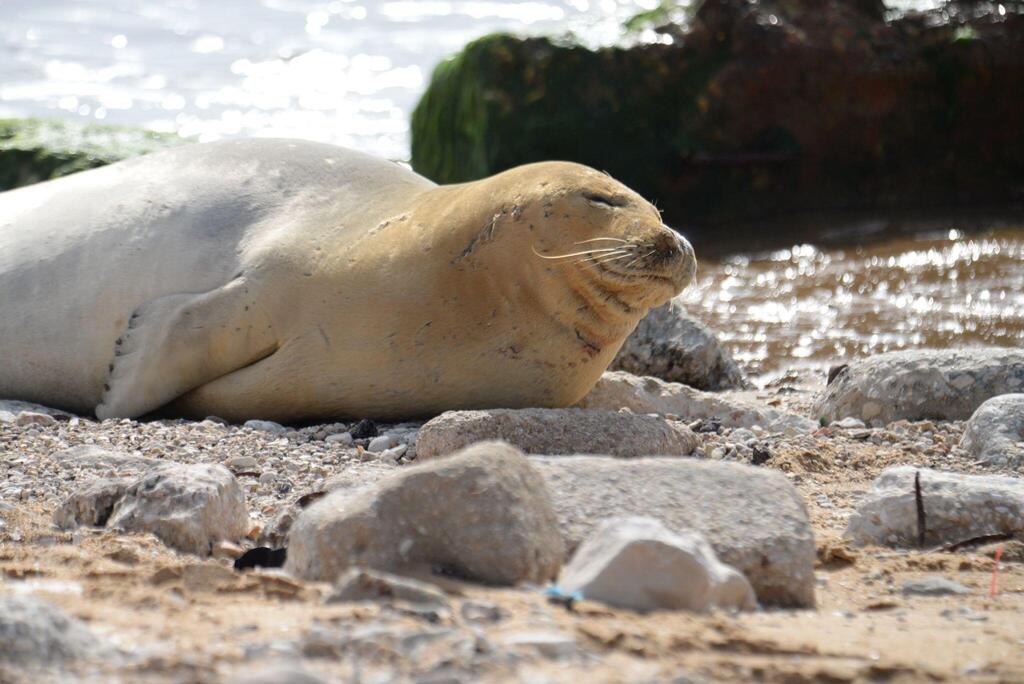Yulia, the Mediterranean monk seal, having a nap on a central Israel beach
(Video: Guy Levian, Nature and Parks Authority)
Yulia the Mediterranean monk seal who arrived at a central Israel beach on Friday is still in the same spot, watched over by volunteers from the Nature and Parks Authority, ensuring that no one approaches her.
More Stories:
In an interview with Hebrew-language Ynet Radio, Guy Levian, the head of the Marine Unit at the Nature and Parks Authority, explained why the monk seal decided to drop by for a rare visit.
5 View gallery


Yulia, the Mediterranean monk seal, having a nap on a central Israel beach
(Photo: Guy Levian, Nature and Parks Authority)
"Since she arrived, we've been trying to understand together with researchers if she is tired, what led her here, perhaps she is injured," he said. "But the conclusion at the moment is that she is simply resting and going through a molting process. It's a process that will likely take a few days. Therefore, at this stage, she prefers to stay on land and rest on the beach."
Levian said that the monk seal Yulia has been spotted in several countries in the region. "The conclusion is that she is a female who was first spotted in Turkey in 2007, so she is older than we initially thought. It is not known exactly what led her here," he said. "She probably came to us by chance."
Regarding the endangered species, Levian said, "In recent years, there has been an encouraging increase with cautious optimism. We can say that the numbers of this species are rising, but it is still in danger of extinction and therefore, of course, all these marine mammal species are protected natural treasures, and it is forbidden to harm them."
Meanwhile, researchers from the marine environmentalist group Delfis are constantly consulting with veterinarians and researchers from abroad, and for this purpose, they send them constant updates on the condition of the seal. Currently, there is no particular reason for concern.
According to Dr. Mia Elasar, the head of the monk seal research in Israel, "It is evident that the monk seal is shedding its fur - a process that requires a lot of energy for the seals, and it is known that they prefer to undergo it on land. There are many cases where monk seals spend days on the shore without entering the water to hunt."
To protect the rare monk seal, Israel Nature and Parks Authority inspectors and volunteers monitor Yulia around the clock, documenting her and providing the footage to researchers to determine if her behavior is normal as observed by researchers in Turkey.
5 View gallery


Israel Nature and Parks Authority inspectors and volunteers monitor Yulia around the clock
(Photo: Israel Nature and Parks Authority)
The Mediterranean monk seal, of the earless seal family, is one of the rarest mammals in the world and is in grave danger of extinction. The seals live only in the Mediterranean Sea. It measures about 2.5 meters in length and weighs about 350 kg.
Before the establishment of Israel, sightings of these seals were more common. Reports of individual sightings were documented from the 1920s through 1958. In 2010, reports of monk seals began to surface on beaches where they hadn’t been observed for several decades, such as in Syria, Lebanon, and Israel.
Today, the population of Mediterranean monk seals is estimated at around 900 individuals, with approximately 400 of them living along the coasts of Greece, Cyprus, and Turkey.
Earlier this year, the Israeli environmentalist group published a survey of the country's coasts it examined that could serve as potential habitats for the rare Mediterranean monk seals that were once common in the region.






